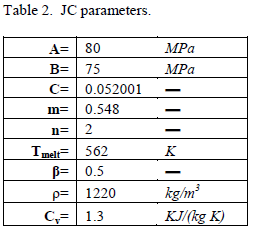Hi all,
I am simulating quasi-static compression tests of battery packs.
Due to the reason that this model should be used for high-velocity impact tests as well, it is necessary to set up the polycarbonate with the Johnson-Cook Material law.
According to
https://community.altair.com/community?id=community_question&sys_id=7ba600ba1b2bd0908017dc61ec4bcb7a
the hardening exponent n has to be between 0 and 1.
According to a publication of the 'Army Research Laboratory' the hardening exponent is evaluated to 2 for this specific polycarbonate test specimens (they carried out several compression tests at different strain rates and temperatures):

These JC parameters have already been used for other simulations. These simulations have been carried out with LS-DYNA. Here it is possible to enter a value for n which is larger than 1.
Furthermore i found hardening exponents for other materials which are larger than 1 as well.
So, do you have any recommendations what I could do?
Thanks a lot and kind regards,
Michael